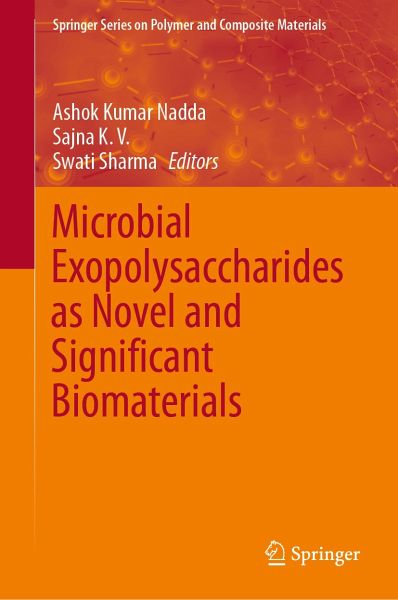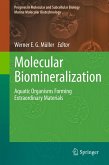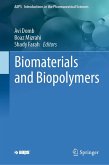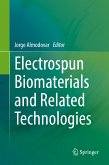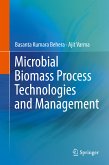Microbial Exopolysaccharides as Novel and Significant Biomaterials (eBook, PDF)
Redaktion: Nadda, Ashok Kumar; Sharma, Swati; K. V., Sajna
105,95 €
105,95 €
inkl. MwSt.
Sofort per Download lieferbar

53 °P sammeln
105,95 €
Als Download kaufen

105,95 €
inkl. MwSt.
Sofort per Download lieferbar

53 °P sammeln
Jetzt verschenken
Alle Infos zum eBook verschenken
105,95 €
inkl. MwSt.
Sofort per Download lieferbar
Alle Infos zum eBook verschenken

53 °P sammeln
Microbial Exopolysaccharides as Novel and Significant Biomaterials (eBook, PDF)
Redaktion: Nadda, Ashok Kumar; Sharma, Swati; K. V., Sajna
- Format: PDF
- Merkliste
- Auf die Merkliste
- Bewerten Bewerten
- Teilen
- Produkt teilen
- Produkterinnerung
- Produkterinnerung

Bitte loggen Sie sich zunächst in Ihr Kundenkonto ein oder registrieren Sie sich bei
bücher.de, um das eBook-Abo tolino select nutzen zu können.
Hier können Sie sich einloggen
Hier können Sie sich einloggen
Sie sind bereits eingeloggt. Klicken Sie auf 2. tolino select Abo, um fortzufahren.

Bitte loggen Sie sich zunächst in Ihr Kundenkonto ein oder registrieren Sie sich bei bücher.de, um das eBook-Abo tolino select nutzen zu können.
This book examines the commercial role of various microbial polysaccharides and recent advances in their production. Offering an overview of the physiological role, biosynthetic pathways and regulatory mechanisms, it also explores the current challenges regarding bioprocessing for the production of polysaccharides.
- Geräte: PC
- ohne Kopierschutz
- eBook Hilfe
- Größe: 6.04MB
Andere Kunden interessierten sich auch für
![Biological Adhesives (eBook, PDF) Biological Adhesives (eBook, PDF)]() Biological Adhesives (eBook, PDF)161,95 €
Biological Adhesives (eBook, PDF)161,95 €![Molecular Biomineralization (eBook, PDF) Molecular Biomineralization (eBook, PDF)]() Molecular Biomineralization (eBook, PDF)145,95 €
Molecular Biomineralization (eBook, PDF)145,95 €![Biomaterials and Biopolymers (eBook, PDF) Biomaterials and Biopolymers (eBook, PDF)]() Biomaterials and Biopolymers (eBook, PDF)48,95 €
Biomaterials and Biopolymers (eBook, PDF)48,95 €![Electrospun Biomaterials and Related Technologies (eBook, PDF) Electrospun Biomaterials and Related Technologies (eBook, PDF)]() Electrospun Biomaterials and Related Technologies (eBook, PDF)129,95 €
Electrospun Biomaterials and Related Technologies (eBook, PDF)129,95 €![Biochemical Mechanisms for Metabolic Syndrome (eBook, PDF) Biochemical Mechanisms for Metabolic Syndrome (eBook, PDF)]() Biochemical Mechanisms for Metabolic Syndrome (eBook, PDF)202,95 €
Biochemical Mechanisms for Metabolic Syndrome (eBook, PDF)202,95 €![Biological Adhesives (eBook, PDF) Biological Adhesives (eBook, PDF)]() Biological Adhesives (eBook, PDF)161,95 €
Biological Adhesives (eBook, PDF)161,95 €![Microbial Biomass Process Technologies and Management (eBook, PDF) Microbial Biomass Process Technologies and Management (eBook, PDF)]() Basanta Kumara BeheraMicrobial Biomass Process Technologies and Management (eBook, PDF)113,95 €
Basanta Kumara BeheraMicrobial Biomass Process Technologies and Management (eBook, PDF)113,95 €-
-
-
This book examines the commercial role of various microbial polysaccharides and recent advances in their production. Offering an overview of the physiological role, biosynthetic pathways and regulatory mechanisms, it also explores the current challenges regarding bioprocessing for the production of polysaccharides.
Dieser Download kann aus rechtlichen Gründen nur mit Rechnungsadresse in A, B, BG, CY, CZ, D, DK, EW, E, FIN, F, GR, HR, H, IRL, I, LT, L, LR, M, NL, PL, P, R, S, SLO, SK ausgeliefert werden.
Produktdetails
- Produktdetails
- Verlag: Springer International Publishing
- Seitenzahl: 339
- Erscheinungstermin: 8. Juli 2021
- Englisch
- ISBN-13: 9783030752897
- Artikelnr.: 62211747
- Verlag: Springer International Publishing
- Seitenzahl: 339
- Erscheinungstermin: 8. Juli 2021
- Englisch
- ISBN-13: 9783030752897
- Artikelnr.: 62211747
- Herstellerkennzeichnung Die Herstellerinformationen sind derzeit nicht verfügbar.
Dr. Ashok Kumar Nadda is working as an Assistant Professor in the Department of Biotechnology and Bioinformatics, Jaypee University of Information Technology, Waknaghat, Solan, Himachal Pradesh, India. He holds an extensive 'Research and Teaching' experience of more than 10 years in the field of microbial biotechnology, with research expertise focusing on various issues pertaining to 'nano-biocatalysis, microbial enzymes, biomass, bioenergy' and 'climate change. He worked as a post-doctoral fellow in Huazhong Agricultural University, Wuhan China. He also worked as a Brain Pool researcher/ Assistant Professor at Konkuk University, Seoul, South Korea. Dr. Ashok has a keen interest in microbial enzymes, biocatalysis, CO2 conversion, biomass degradation, biofuel synthesis, and bioremediation. Dr. Ashok has published more than 100 scientific contributions in the form of research, review, books, book chapters and others at several platforms in various journals of international repute. He isthe main series editor of "Microbial Biotechnology for environment, energy and health" that publishes the books under Taylor and Francis, CRC Press USA. He is also a member of the editorial board and reviewer committee of the various journals of international repute. He has presented his research findings in more than 40 national/international conferences. He has attended more than 50 conferences/ workshops/colloquia/ seminars etc. in India and abroad. Dr. Kuttuvan Valappil Sajna (K V Sajna) is currently a postdoctoral researcher at the Department of Biochemistry, Indian Institute of Science, Bengaluru, India. She has completed her Ph.D. from the Department of Biotechnology, CSIR-National Institute for Interdisciplinary Science and Technology, Trivandrum, India in 2017. Her areas of interest are biosurfactants, exopolysaccharides, bioremediation and sustainable technology. Her work has been published in various internationally reputed journals namely GreenChemistry, Bioresource Technology, International Journal of Biological Macromolecules and Biochemical Engineering Journal. She has published 9 papers, 3 book chapters and 15 conference communications. She was a university gold medallist and one of the best business plan award winners in the CSIR Technology led entrepreneurship program. She has presented papers at international conferences including the 5th IFIBiop conference held at National Taiwan University, Taipei and ESBES-IFIBIOP 2014 Symposium held at Lille, France. She has also worked at the University of Naples, Italy for three months as a part of the Bioassort program under Marie Curie Actions -International Research Staff Exchange scheme. Dr. Swati Sharma is working as assistant professor in University Institute of Biotechnology, Chandigarh University, Mohali, Punjab India. She is working extensively on the waste biomass, biopolymers and their applications in various fields. Dr. Sharma has completed her PhD. from University Malaysia Pahang, Malaysia. She worked as a visiting researcher in the college of life and environmental sciences at Konkuk University, Seoul South Korea. Dr. Sharma has completed her masters (M.Sc.) from Dr. Yashwant Singh Parmar University of Horticulture and Forestry, Nauni Solan H.P. India. She has also worked as a program co-coordinator at the Himalayan action research center Dehradun and Senior research fellow at India agricultural research institute in 2013-2014. Dr. Sharma has published her research papers in reputed international journals. Presently, Dr. Sharma's research is in the field of bioplastics, hydrogels, keratin nano-fibers and nano-particles, biodegradable polymers and polymers with antioxidant and anticancer activities and sponges. Dr. Swati has published 20 research papers in various internationally reputed journals, 5 books, and a couple of book chapters.
Microbial exoploysaccharides: An introduction.- Techniques used for characterization of microbial exopolysaccharides: A review.- Molecular basis and genetic regulation of EPS.- Molecular engineering of bacterial exopolysaccharide for improved properties.- Extremophiles: As a versatile source of EPS.- Pullulan: biosynthesis, production and applications.- Exopolysaccharides in drug delivery systems.- Exopolysaccharides in food processing industrials.- Microbial EPS as immunomodulatoryagents.- Novel insights of microbial exopolysaccharides as bio-adsorbents for the removal of heavy metals from soil and wastewater.- Applications of EPS in environmental bioremediations.- Cost-benefit analysis and industrial potential ofexopolysaccharides.
Microbial exoploysaccharides: An introduction.- Techniques used for characterization of microbial exopolysaccharides: A review.- Molecular basis and genetic regulation of EPS.- Molecular engineering of bacterial exopolysaccharide for improved properties.- Extremophiles: As a versatile source of EPS.- Pullulan: biosynthesis, production and applications.- Exopolysaccharides in drug delivery systems.- Exopolysaccharides in food processing industrials.- Microbial EPS as immunomodulatoryagents.- Novel insights of microbial exopolysaccharides as bio-adsorbents for the removal of heavy metals from soil and wastewater.- Applications of EPS in environmental bioremediations.- Cost-benefit analysis and industrial potential ofexopolysaccharides.
